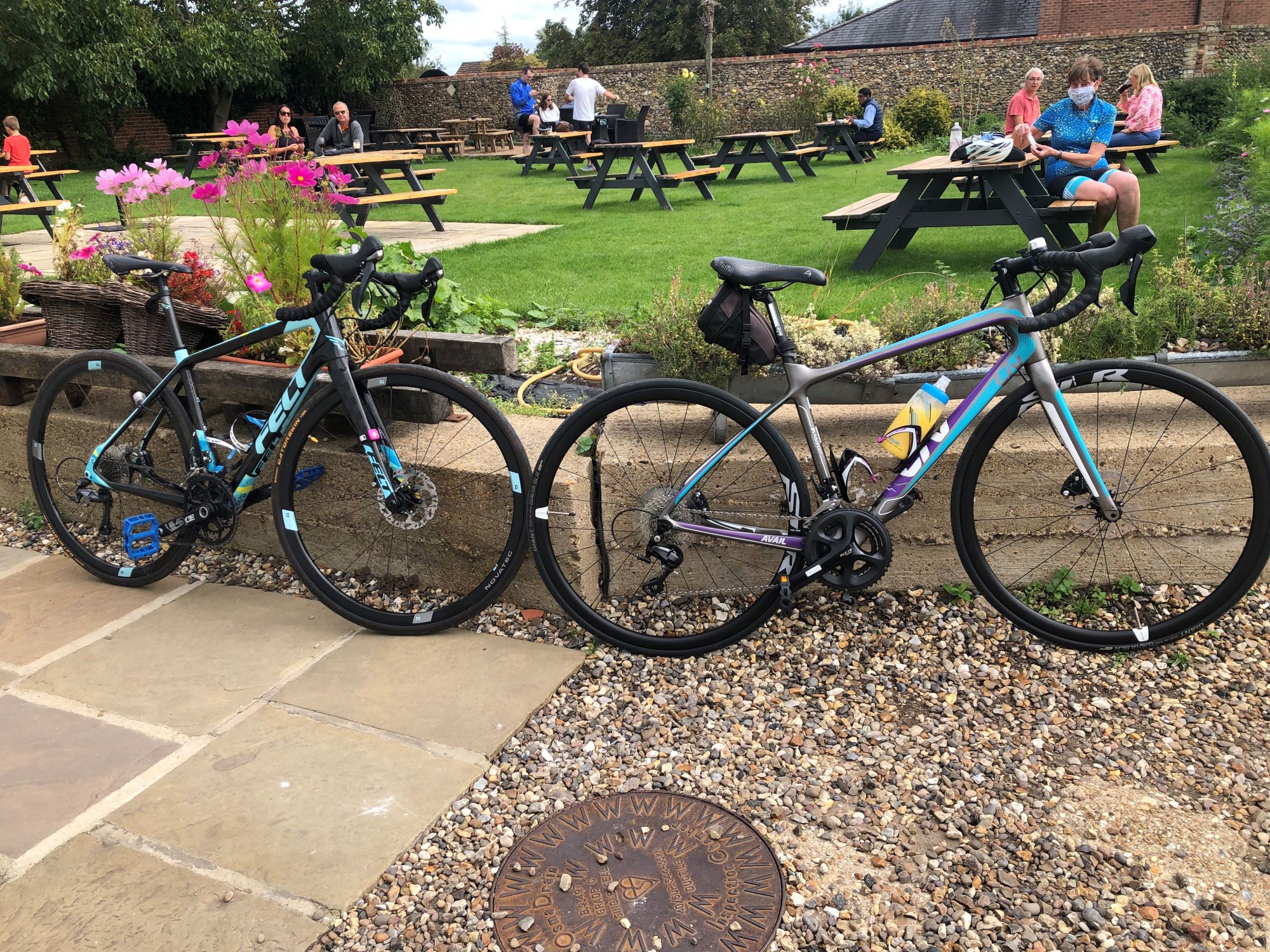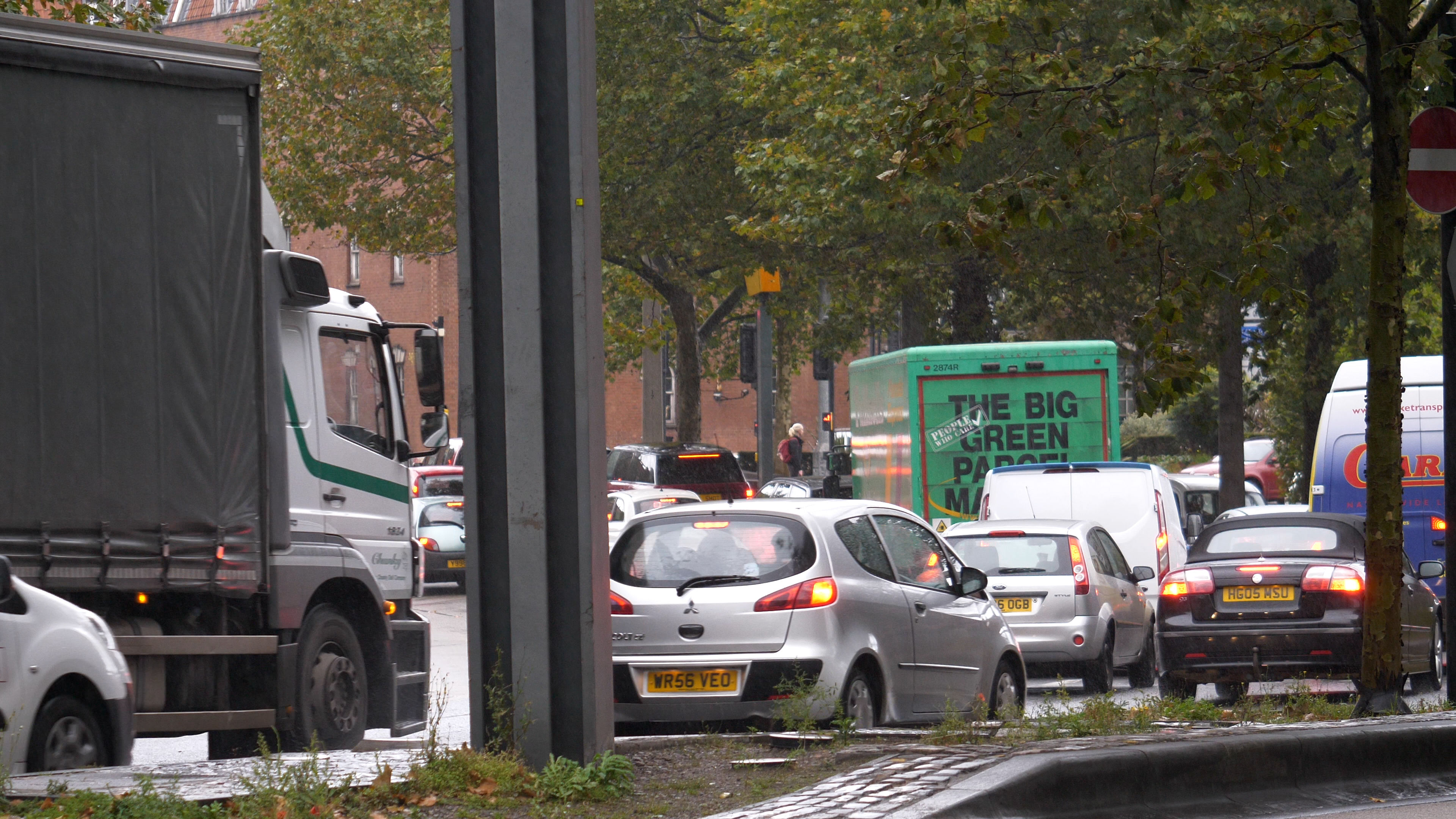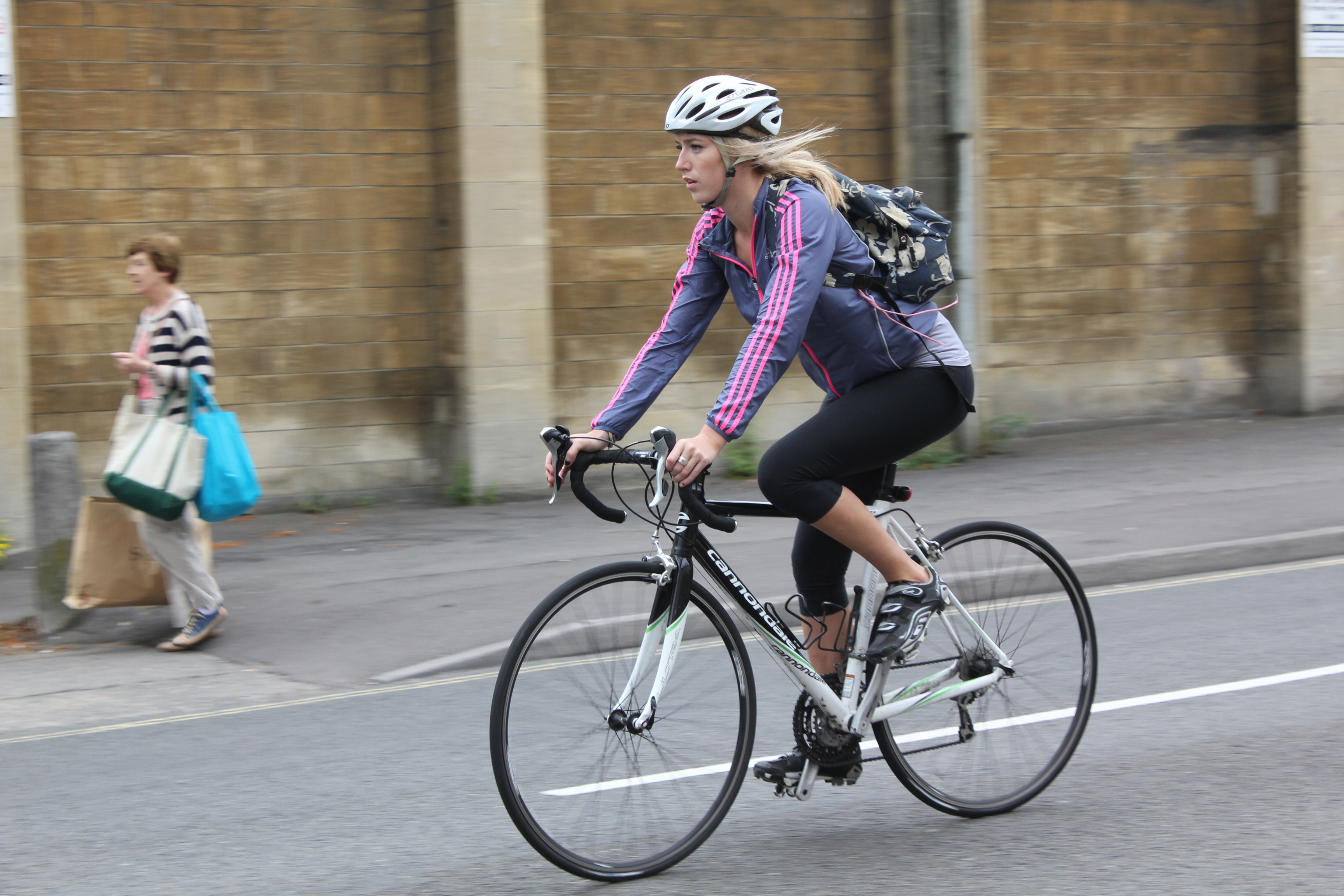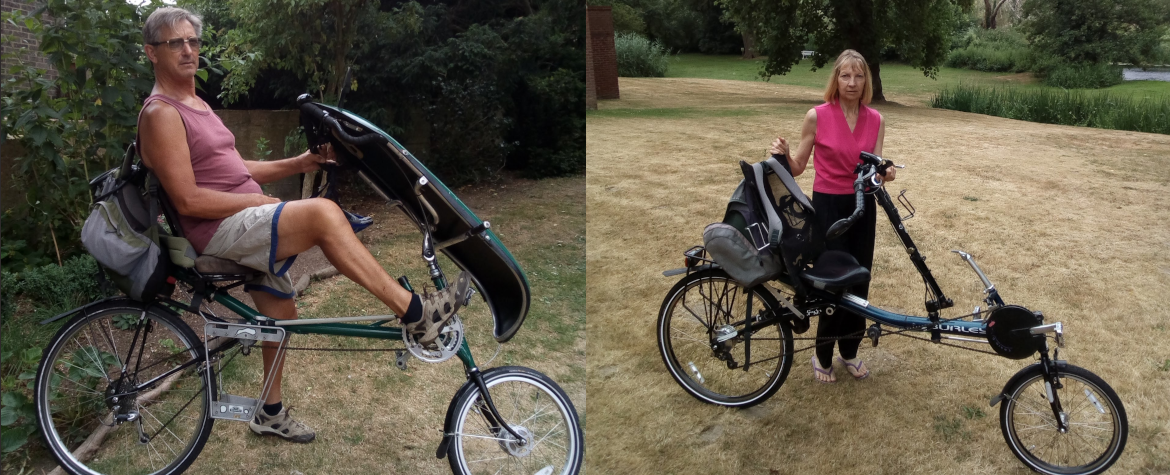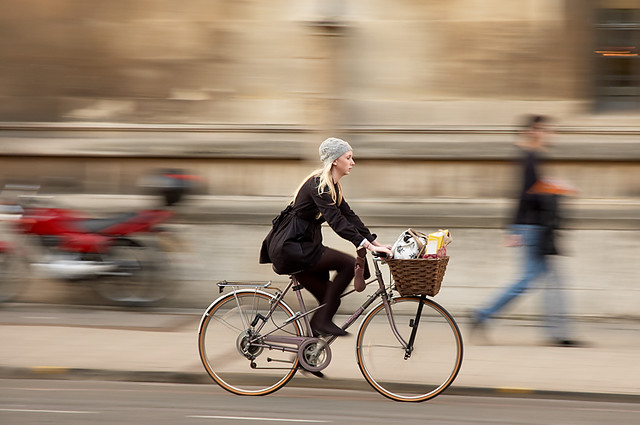How much money can you save by cycling?
According to the Institute for Government the cost-of-living crisis “refers to the fall in ‘real’ disposable incomes (that is, adjusted for inflation and after taxes and benefits) that the UK has experienced since late 2021”.
The result? Rising energy bills, increases in food costs and soaring fuel prices.
As many of us think about how to save money, Cycling UK wanted to share with you how cycling can also play a part in reducing your bills.
Cyclescheme, a major provider of the Government’s Cycle to Work programme, did some research into the annual costs of running a car compared to those of owning a cycle. In 2017, it found that running a car costs on average £732 per annum; a cycle, however, came in at just £396.
We recognise that it’s difficult or even impossible for most people to replace their cars with a cycle. But this isn’t about getting rid of your car and cycling every journey, but rather about making small, manageable changes that can make real differences.
According to the results of the National Travel Survey (which covers households in England only) 36% of people who have a driving licence also cycle, and 87% people aged 18+ who cycle, also drive.
According to Department for Transport statistics, 72% of all trips made in England in 2021 were under five miles. Over four-fifths of trips under one-mile were walks but for journeys between one and five miles, 67% of them were made by car or van, either as a driver or passenger.
Below, we will look at the savings you can make by switching from your car to your bike for short journeys, but first, let’s compare the big expenses.
Upfront costs
Carflation, a study by Money Barn, showed that the cost of buying a new car is overtaking wages at a staggering rate. Taking an average of the 84 cars listed by Carflation, purchasing a new car in 2012 would have set you back on average £29,367 (136.6% of the median salary in 2012). Ten years later in 2022 people were spending an average of £41,219 (158.7% of the median salary in 2022). An increase of £11,853, or 40%.
Used car prices are lower, but the average cost is still rising. Auto Traders Retail Price Index showed that the average price of a used car increased 2.8% in May 2023 to £17,815 – the 38th consecutive month of year-on-year retail price growth – compared to £14,276 in June 2021.
Your initial outlay when buying a cycle on the other hand is much lower. According to the Bicycle Association in 2020, the average price paid for a bike in the UK was £332, while that of an e-cycle was £1,854.
Fuel costs
Fuel prices have decreased since the all-time high in July 2022 but prices still represent a significant outlay for car drivers. The RAC Fuel Watch has unleaded petrol at 143.29 pence per litre and diesel at 145.61 pence per litre at the time of writing. That means filling up the average 65-litre petrol-run car would set you back £93.14.
According to the National Travel Survey, on average people in England made 757 trips per person in 2021 (this figure is lower than normal due to the pandemic). Most of them were in cars and often for short trips.
Imagine the money we could save if we switched those short drives to pick up a few items at the shops or dropping the kids off at school to a bike.
We did a little calculation for you to estimate how much you could save per year on fuel by switching trips under five miles from the car to a bike. We looked at three different types of car: a Peugeot 208, as the UK’s most fuel-efficient car; a Ford Focus, as one of the most popular cars on our roads; and a Kia Sportage, as one of the most popular SUVs in the UK.
- Let’s say Sadiq owns a Peugeot 208, Bob owns a Ford Focus, and Clara owns a Kia Sportage
- In line with the National Travel Survey on average car drivers made about 300 trips in 2021, and 180 of these were under five miles
- If we assume that all these journeys were 2.5 miles these short trips would add up to 450 miles per year
- With unleaded petrol costing 143.29 pence per litre, Sadiq would save approximately £54.88, Bob approximately £48.67, and Clara around £69.32, if they switched those short journeys from the car to their bikes
- We used the Confused.com fuel cost calculator to work this out
- Note: As the 2021 figures are lower than normal due to the pandemic we can expect that these figures will usually be higher.
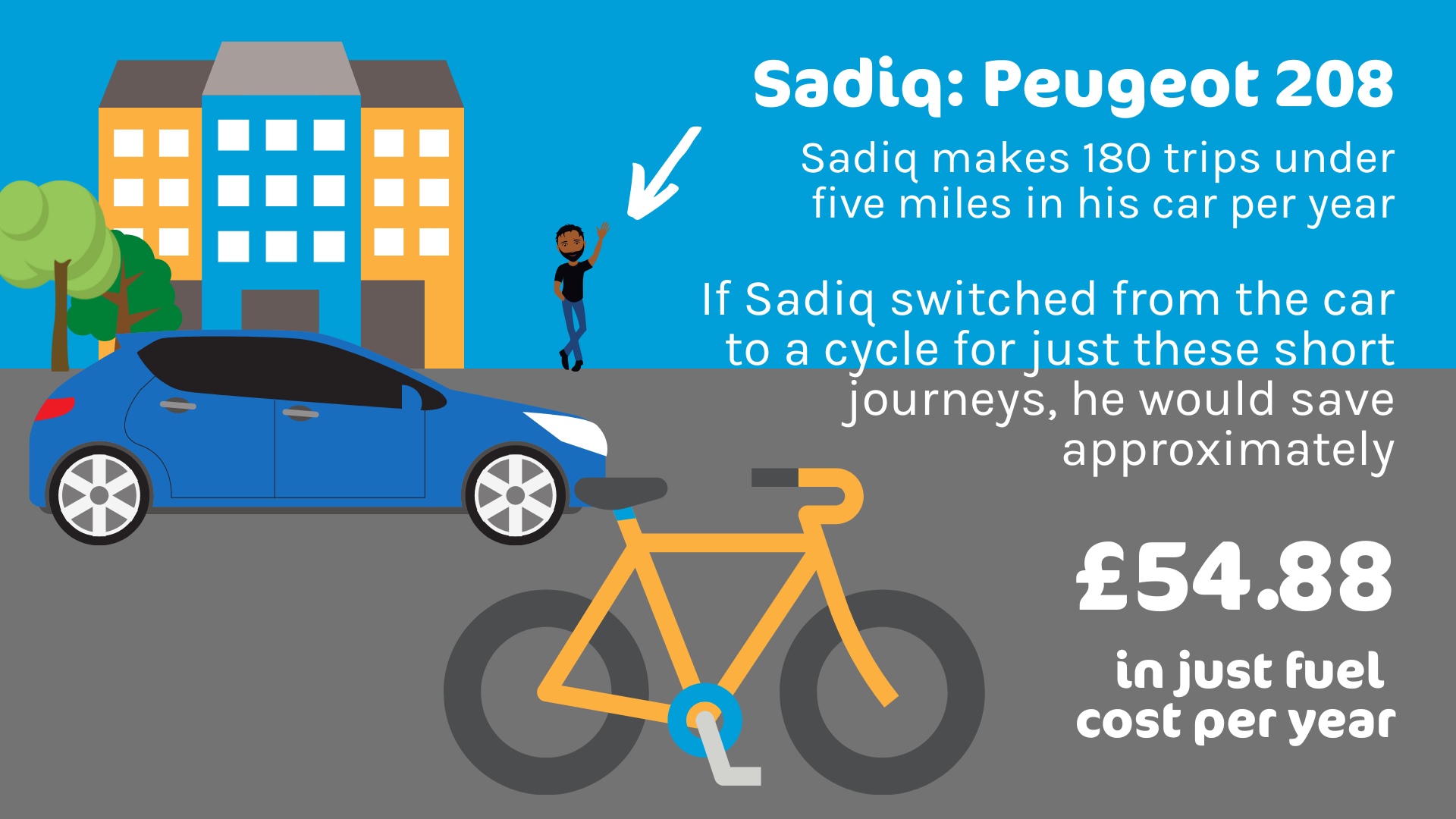
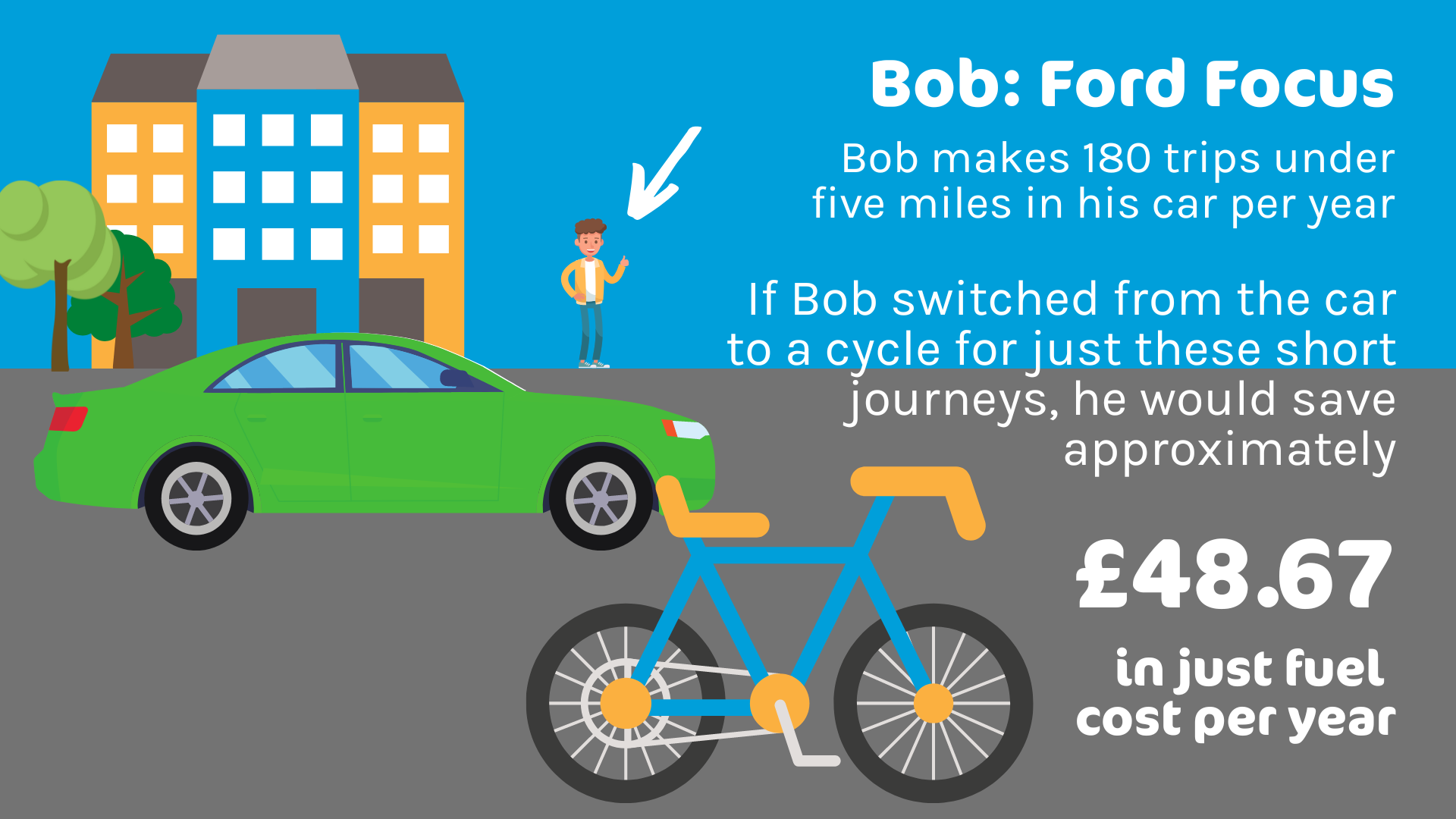
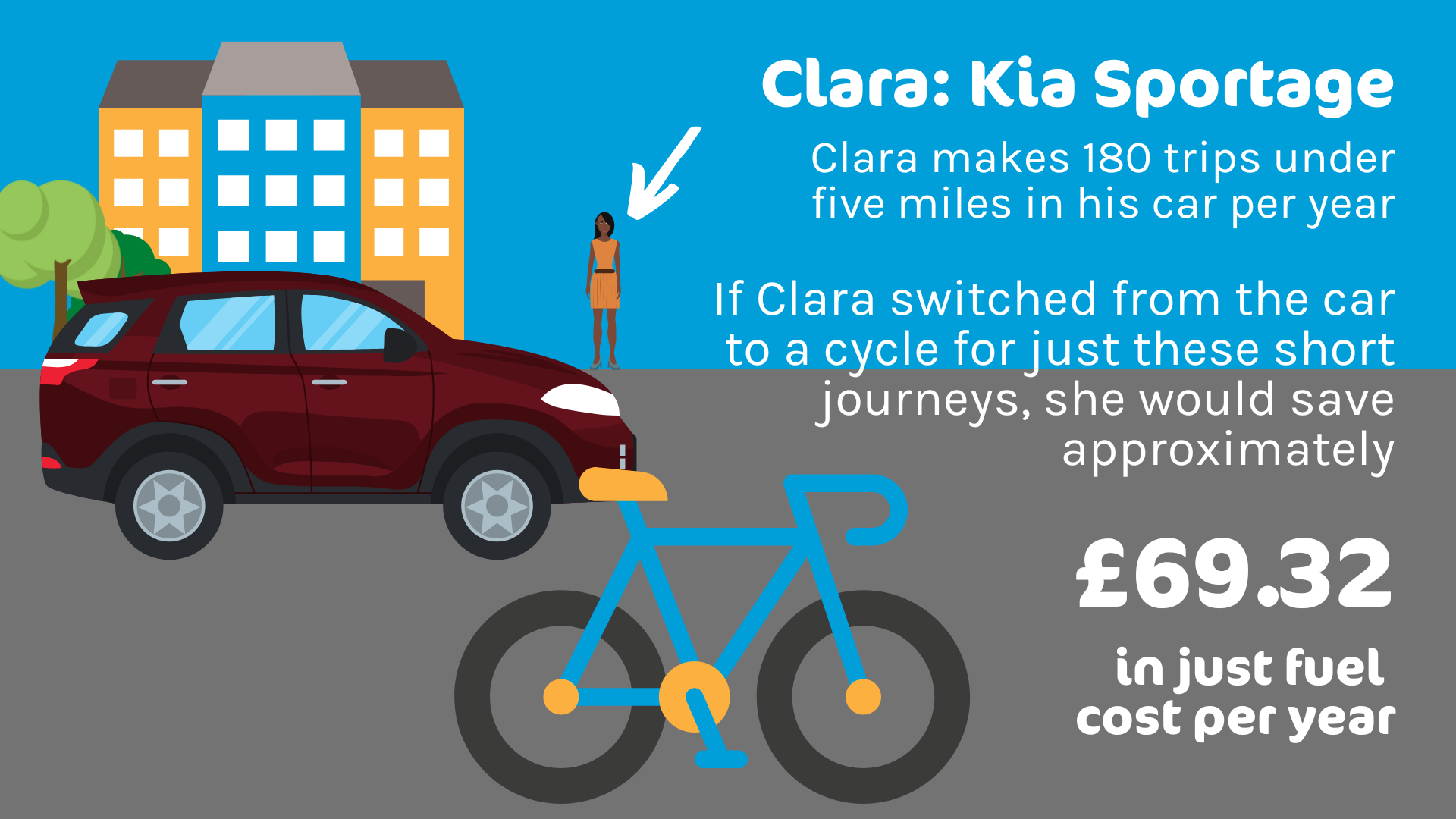
However, fuel is just one cost to consider when it comes to running a car. There’s also maintenance, insurance, Vehicle Excise Duty and more.
Maintenance costs
The average cost of a full car service depends on your car. For a small car it’s about £155, for a medium-sized car it’s £205 and for a large car £395. This doesn’t include the cost of any replacement parts, repair or labour cost (unless you’re capable of fixing your own car).
Cycle replacement parts are far cheaper than those needed for a car. A service costs between about £25 and £100, depending on your bike and the level of service you require.
One big difference is that many cyclists can do most repairs themselves; this isn’t true of cars anymore. Cycling UK has lots of helpful videos, advice and courses to help you improve your bike mechanic skills.
Vehicle insurance
The cost of car insurance went up by 20% over the past year. The average cost of fully comprehensive car insurance in the UK is now £657 a year.
However, premiums vary due to things like age of the driver and where in the country they live. They’ll be much higher for a 20-year-old living in Greater Manchester, for example.
Unlike with cars, there is no legal obligation to insure your cycle. That doesn’t mean you shouldn’t, though. A Cycling UK membership comes with free £10m liability insurance cover. With individual membership starting at £33 a year, this is a huge saving. But even comprehensive cycle-specific insurance is much cheaper than that for a motor vehicle, at about £91.
Road tax
Most people pay for the roads and their maintenance through local and national taxes, whatever their choice of transport.
What some confuse with road tax is Vehicle Excise Duty (VED). This is determined by how polluting your vehicle is. You’ll pay a rate based on a vehicle’s CO2 emissions the first time it’s registered. You’ll then pay vehicle tax every 6 or 12 months at a different rate. Vehicle tax rates explained.
If you drive an electric car with no emissions, you don’t have to pay VED, but if you drive a gas-guzzling SUV, you’ll pay a lot more. That’s why people cycling don’t have to pay VED – they burn calories, not carbon.
As a guide, with an average family car, such as a Ford Focus, you’ll pay £180 a year in VED.
The costs
So how much does owning a car cost compared to owning a cycle? We worked out some average costs of car ownership versus cycle ownership, using the three marques mentioned above, plus an electric car, against an average cycle, an average e-cycle and a reasonably priced hybrid and e-cycle from Halfords. See the tables for the details.
Costs in first year of owning a car compared to a cycle
Model
Cost
Insurance
Servicing
VED
Fuel
Total
Average cycle
£835
£91
£50
£0
£0
£976
Carrera Subway 2 Hybrid
£375
£49.49
£50
£0
£0
£474.49
Average e-cycle
£1,201
£110
£50
£0
£4.10
£1,365.10
Carrera Impel im-1 Electric Hybrid
£1,099
£82.59
£50
£0
£4.10
£1,235.69
Peugeot 208
£19,080
£416
£155
£190
£124.11
£19,965.11
Ford Focus
£23,500
£416
£205
£190
£126.48
£24,437.48
Kia Sportage
£27,250
£416
£395
£945
£163.73
£29,169.73
Tesla
£48,490
£629
£204
£0
£51.22
£49,374.22
Costs in subsequent years of owning a car compared to a cycle
Model
Cost
Insurance
Servicing
VED
Fuel
Total
Average cycle
£0
£91
£50
£0
£0
£141
Carrera Subway 2 Hybrid
£0
£49.49
£50
£0
£0
£99.49
Average e-cycle
£0
£110
£50
£0
£4.10 (+ £250)*
£164.10 (£414.10)
Carrera Impel im-1 Electric Hybrid
£0
£82.59
£50
£0
£4.10 (+ £250)*
£136.69 (£386.69)
Peugeot 208
£0
£416
£155
£165
£124.11
£860.11
Ford Focus
£0
£416
£205
£165
£126.48
£912.48
Kia Sportage
£0
£416
£395
£165
£163.73
£1,139.73
Tesla
£0
£629
£204
£0
£51.22(+ £3,900)*
£884.22 (£4,784.22)
* Cost of replacement battery if required
Comparing the costs of owning an average bike to an average car (a Ford Focus), in the first year you’ll save £23,461. In subsequent years you’ll save £771.
More realistically, though, you’re more likely to replace a second runabout car with an e-cycle. So let’s compare the Impel e-cycle with the Peugeot 208. The savings are less, but still significant.
In the first year you’ll save £18,729.09 and in subsequent years £723.09 or £473.09 if the Impel requires a new battery. Keep in mind, though, that cars of three years and older require an MOT costing £54.85 every year, and you’re unlikely to buy a car outright, so you’ll have loan repayments to consider, too.
Costs of driving vs benefits of cycling
In addition to the high cost of owning a car, there are also lots of hidden costs to driving and benefits to cycling you might not immediately think of.
Parking costs
Parking for cyclists is free. Whether you’re parking in a bike stall or designated space, or you’ve locked your bike to a pole, railing or tree, it won’t cost you anything.
The average cost of parking a car in the UK is between £1.10 and £1.65 per hour. It might not sound like much, but with frequent shopping trips, it adds up. It’s not just shopping trips, either, if you work in central London and drive your car to the office you can expect to fork out around £3,168 a month!
Health and wellbeing
The benefits of cycling to our health and wellbeing are enormous and widely documented.
Cycling is excellent exercise. It helps people meet their recommended physical activity guidelines and improves their physical health while reducing the risk of premature death and ill health.
Cycling to work is linked with a 45% lower risk of developing cancer, and a 46% lower risk of cardiovascular disease (CVD), compared to commuting by car or public transport.
The importance of exercise on our mental health and wellbeing is often underestimated by individuals and even some health care professionals. Aerobic exercises – including cycling – have been proven to reduce anxiety and depression.
The planet
Climate change threatens the future of our way of life and economy, as well as our health and the natural environment we all treasure.
Cycling provides a highly efficient transport option and it is part of the solution for a low-carbon future.
A report based on 2015 figures suggested that a dramatic, worldwide increase in cycling – from c.6% of all urban passenger miles to 11% in 2030 and 14% in 2050 – could cut CO2 emissions from urban passenger transport by about 7% by 2030, and nearly 11% in 2050.
If people in England became as likely to cycle as people in the Netherlands, there would be around two million fewer car-driving commuters. Consequently, English authorities could reduce CO2 outputs by more than 1,500 tonnes a year on average.
Put simply, switching our short journeys (five miles and under) from a car to a bike is one of the simplest lifestyle choices that individuals can make to reduce their carbon footprint.
If you’re thinking of making a switch from the car to the bike for some of your shorter journeys, make sure to read our advice pages. Whether you’re a beginner, need help planning a route, or tips on commuting, Cycling UK can support you.
First published in March 2022, updated in July 2022 with additional material by Cycling UK digital officer Rebecca Armstrong, and updated in June 2023 with the most recent research.
References for table data
- Average bike costs from Aviva
- Subway and Impel from Halfords
- Cars from manufacturers’ websites
- Average car insurance costs from Association of British Insurers
- Average electric car insurance costs from NimbleFins
- Subway and Impel insurance from Cycle Insurance
- e-cycle charging costs from Raleigh
- Tesla charging costs from Pod Point
- Tesla battery cost from Drive Electric
- e-cycle battery cost from ebikeshop
- Servicing costs from Checkatrade

